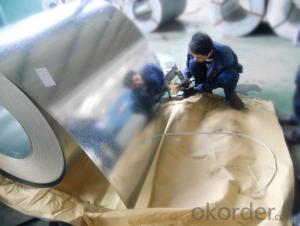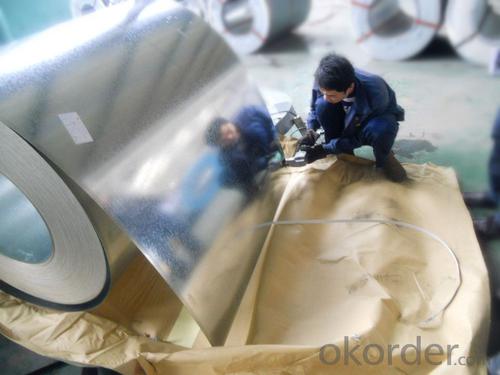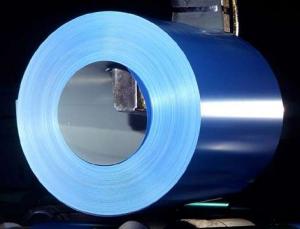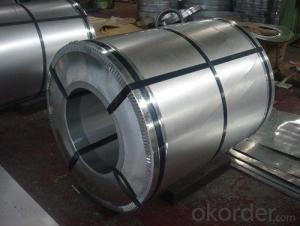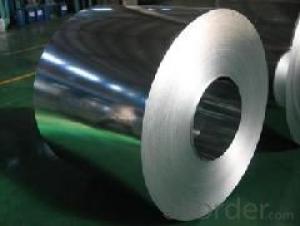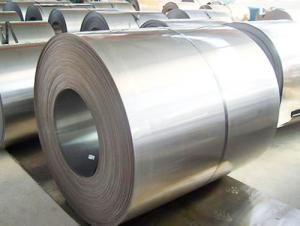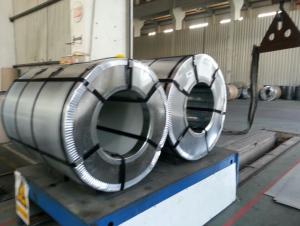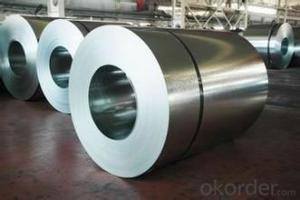HOT-DIP GALVANISED STEEL IN COIL -STOCK
- Loading Port:
- Shanghai
- Payment Terms:
- TT OR LC
- Min Order Qty:
- -
- Supply Capability:
- 5000 m.t./month
OKorder Service Pledge
Quality Product, Order Online Tracking, Timely Delivery
OKorder Financial Service
Credit Rating, Credit Services, Credit Purchasing
You Might Also Like
HOT-DIP GALVANISED STEEL IN COIL
STANDARD:JIS G 3302, SGCC
ZINC COATING: 80g/m2
SURFACE: REGULAR SPANGLE, CHROMATED, DRY
COIL ID:508mm
COIL WEIGHT: 3-6 tons
THICKNESS:0.2MM-1.2MM
WIDTH:800MM-1250MM
TOLERANCE:WIDTH 0,+3 MM,THICKNESS:+/-0.02MM,ZINC COATING:+/-15G/M2. AS PER STANDARD JISG3302, SGCC.
PRODCUTION TIME:WITHIN 30 DAYS AFTER RECEIPT DOWN PAYMENT.
PAYMENT TERM:20%TT,80%BL COPY/ 100% IRREVOCABLE LC AT SIGHT.
- Q: How are steel coils used in the production of pipes?
- Steel coils are used in the production of pipes by being unwound and then formed into the desired pipe shape through a series of bending, welding, and cutting processes. The steel coils provide the raw material for the pipes and ensure their strength and durability.
- Q: What are the common applications of stainless steel coils?
- Stainless steel coils possess unique properties and characteristics that allow for a wide range of applications. Some of the most frequently seen uses for stainless steel coils include the following: 1. Automotive industry: The automotive industry extensively incorporates stainless steel coils in the manufacturing of components such as exhaust systems, mufflers, and catalytic converters. These applications benefit from stainless steel's corrosion resistance and durability, making it an ideal choice. 2. Construction industry: The construction industry heavily relies on stainless steel coils for structural elements, roofing, cladding, and facades. Stainless steel's high strength, resistance to corrosion, and aesthetic appeal make it a popular choice for architectural projects. 3. Kitchen appliances: Stainless steel coils are commonly utilized in the production of kitchen appliances like refrigerators, stoves, ovens, and dishwashers. Stainless steel's easy cleanability, resistance to heat and stains, and hygienic properties make it the preferred material for these applications. 4. Food processing industry: The food processing industry widely employs stainless steel coils for equipment such as tanks, pipes, and conveyor systems. Stainless steel's corrosion resistance and ease of cleaning ensure the integrity and hygiene of food products. 5. Medical industry: The medical industry extensively utilizes stainless steel coils for various applications, including medical devices, surgical instruments, and implants. Stainless steel's biocompatibility, strength, and resistance to corrosion make it an ideal material for these critical healthcare applications. 6. Energy sector: Stainless steel coils play a crucial role in the energy sector for applications such as heat exchangers, boilers, and pipelines. Stainless steel's high-temperature resistance, excellent mechanical properties, and corrosion resistance make it suitable for these demanding applications. 7. Chemical industry: The chemical industry employs stainless steel coils for storage tanks, piping systems, and reactors. Stainless steel coils are a reliable choice due to their corrosion resistance and ability to withstand high temperatures and aggressive chemicals when handling various chemical substances. 8. Manufacturing industry: Stainless steel coils find extensive use in various manufacturing processes like stamping, forming, and fabrication. The versatility, durability, and ease of machining of stainless steel make it a popular choice for a wide range of industrial applications. In conclusion, the applications of stainless steel coils are vast and varied, thanks to their exceptional properties such as corrosion resistance, strength, durability, and aesthetic appeal.
- Q: What are the challenges in coil recoiling?
- Some of the challenges in coil recoiling include achieving precise and consistent coiling, minimizing coil distortion and tangling, preventing material damage or breakage during recoiling, and ensuring efficient and safe handling of coiled materials. Additionally, factors such as coil size, weight, and material properties can also pose challenges in the recoiling process.
- Q: so i just bought a stainless steel bracelet.......and recently found out that stainless steel isnt actually stainless..........will turpentine ruin it
- real s/steel is nickel and chrome, however manufacturers of kitchenware, e.g s/teel cutlery use the cheaper version of nickel chrome and iron, that is why some s/steel products rust, so if you want to test any products carry asmall magnet and test the article
- Q: How are steel coils used in the manufacturing of suspension springs?
- Steel coils are used in the manufacturing of suspension springs as they provide the necessary strength and resilience to support the weight of the vehicle and absorb shocks and vibrations. The steel coils are shaped and formed into the desired spring shape, which allows them to effectively compress and expand to absorb and distribute the impact and forces experienced during vehicle movement and road conditions.
- Q: What are the benefits of using stainless steel coils?
- There are several benefits of using stainless steel coils. Firstly, stainless steel is highly resistant to corrosion and rust, making it ideal for applications in harsh environments or where exposure to moisture is likely. Secondly, stainless steel coils offer excellent heat resistance, making them suitable for high-temperature applications. Moreover, stainless steel coils are durable and have a long lifespan, reducing the need for frequent replacements. Additionally, stainless steel is easy to clean and maintain, making it a hygienic choice for industries such as food processing and medical equipment manufacturing. Lastly, stainless steel coils provide excellent strength and structural integrity, ensuring the reliability and efficiency of various industrial processes.
- Q: How are steel coils priced?
- Steel coils are priced based on various factors including the current market demand and supply, raw material costs, production and processing expenses, transportation and logistics costs, as well as any additional charges or fees imposed by the manufacturer or supplier.
- Q: I bought a stainless steel mood ring two days ago, but would it rust?Thanks in advance!
- Stainless okorder /
- Q: The steel is orangish in colour and is mostly made of copper
- Steel is an alloy of iron and carbon and optionally one or more of numerous other materials. Copper is normally not used, except sometimes in small percentages. Steel is never yellow or orange in color. Reactivity of steel depends on the materials it is alloyed with. Chromium and nickel with steel make stainless steel, which is much less prone to reactive than iron. .
- Q: What are the common coil handling challenges?
- Common coil handling challenges include the risk of coil damage during handling and transportation, difficulties in aligning and positioning coils accurately, issues with coil slippage and instability, as well as the need for specialized equipment to safely and efficiently handle large and heavy coils. Additionally, managing coil edges and preventing injuries to workers are also common challenges faced in coil handling processes.
Send your message to us
HOT-DIP GALVANISED STEEL IN COIL -STOCK
- Loading Port:
- Shanghai
- Payment Terms:
- TT OR LC
- Min Order Qty:
- -
- Supply Capability:
- 5000 m.t./month
OKorder Service Pledge
Quality Product, Order Online Tracking, Timely Delivery
OKorder Financial Service
Credit Rating, Credit Services, Credit Purchasing
Similar products
Hot products
Hot Searches
Related keywords
